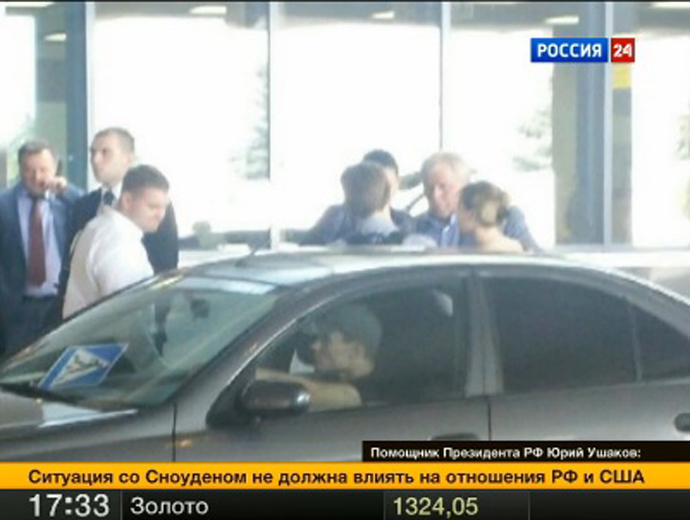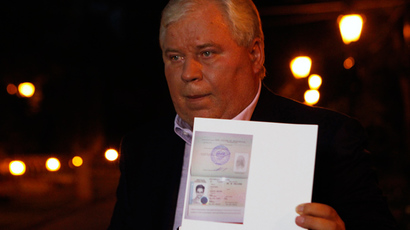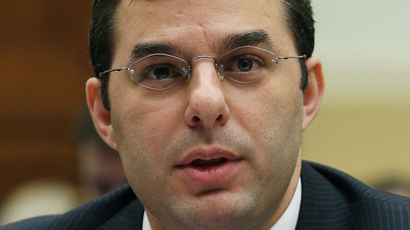Obama cancels Moscow meeting with Putin over Snowden
US President Barack Obama has canceled a meeting with President Vladimir Putin in Moscow which was scheduled for September. The move comes after Russia’s recent decision to grant temporary asylum to NSA leaker Edward Snowden.
The US decision is seemingly a diplomatic snub to Russia amid heightened tensions between the two countries over recent issues listed by the White House as “missile defense and arms control, trade and commercial relations, global security issues, and human rights and civil society in the last 12 months.”
"Russia’s disappointing decision to grant Edward Snowden temporary asylum was also a factor that we considered in assessing the current state of our bilateral relationship," Washington said in a statement.
Citing lack of progress on this and other agenda items, the White
House said the president deemed it more “constructive” to
postpone the summit.
Instead of visiting Putin in Moscow, Obama will add a stop in
Sweden to his early September travel itinerary.
Moreover, the US president will not be meeting alone his Russian
counterpart while he stops over in St. Petersburg for the G20
summit, diplomats said.
Russia responded by saying it is “disappointed” by
the move, with Putin’s aide Yury Ushakov adding that the
situation showed the US “is still not ready to build relations
with Russia on an equal footing.” It is “clear” that
the decision is related to Snowden, he said, reminding that the
US for its part has repeatedly refused Russia’s past extradition
requests.
The cancelation comes just after President Obama expressed his "disappointment" on Snowden’s asylum - and talked of Moscow slipping into "Cold War" mode despite his calls for negotiations.
"There have been times where they slip back into Cold-War thinking and a Cold-War mentality," Obama told to Tonight Show host Jay Leno Tuesday night. "And what I consistently say to them, and what I say to President Putin, is that’s the past and we’ve got to think about the future, and there’s no reason why we shouldn’t be able to cooperate."

Edward Snowden, whose US passport has been revoked, was granted
one year’s temporary asylum in Russia last Thursday, finally
leaving the confines of the Moscow airport where he had been
holed up since June 23. His new residence permit allows the
former CIA employee to work and freely travel all across Russia.
The former CIA employee is wanted in the US on espionage charges
after revealing secret NSA surveillance programs to the public.
Among other issues, Russia and the US have considerable
differences over the situation in Syria, with the US government
determined to see President Bashar Assad ousted from his
position. The House and Senate Intelligence Committees gave a
green light to arm Syrian rebels at the end of July.
Obama has also voiced antipathy towards Russian legislation
against gay rights activism, saying on the Tonight Show that he
has “no patience for countries that try to treat gays and
lesbians and transgendered persons in ways that intimidate them
or are harmful to them.”
The last time the two leaders met was in June at the G8 Summit in
Ireland.
The G20 summit will be held on September 5-6, with the US deeming it sensible to still attend, as the annual gathering brings together the world's largest economies. Obama said that it makes sense for the US to have high-level representation at the event.
John Laughland of the Institute of Democracy and Cooperation
tells RT that, while the US and Russia have drifted on topics
aside from the Snowden affair, considering the positive
sentiments by a large portion of Americans regarding Snowden’s
actions the reaction by the Obama administration seems
disproportionate.
“A lot of Americans regard him
as an honorable man, who is a whistleblower and not a traitor.
Nobody likes the idea that their emails and internet surfing is
being trawled through by federal spy agencies. And it’s quite
clear that Snowden did what he did because he thought that what
was going on was wrong. He wasn’t selling his secrets to a
foreign country for personal gain, he was revealing them to the
American people themselves. So, I think anyone that is reasonable
about this can only conclude that he has acted honorably. And
that’s why I’ve said... that I think Obama’s reaction to this was
infantile. I can understand it, but I think that it’s been
brought on by a rather infantile atmosphere in American political
life.”
A brief history of recent Russian-US high officials’ meeting cancellation
March 1999 – Russian Prime Minister Evgeny Primakov flying towards the US orders to the plane to turn back midair and cancels the trip after he learns that NATO starts military operation against Yugoslavia and the US Air Force bombs Belgrade.
September 2012 – US President Barack Obama calls off his trip to the APEC summit in Vladivostok due to his taking part in the Democratic National Convention, a key event in the presidential race.
May 2012 – Russian President Vladimir Putin decides not to take part in the G8 summit at Camp David, as he is busy forming a government following his inauguration. He instead delegates Prime Minister Dmitry Medvedev to attend the summit.














